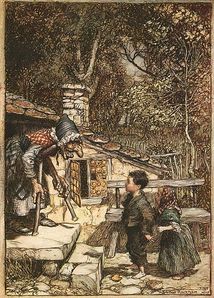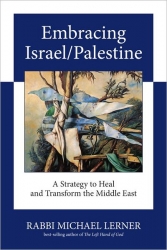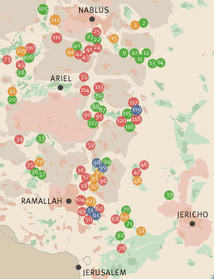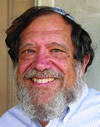
Illustration by Arthur Rackham, 1909
Children have been told horror stories for as long as storytelling has existed. Should a child become traumatized hearing a story like Hansel and Gretel, where the witch plans to throw the children into the oven to make a nice meal, parents can tell the child not to worry, “That’s just a fairy tale. Things like that don’t really happen.” But they do.
As a child, I grew up with images of Nazi ovens incinerating Jews. Scenes of little children and old women, naked, emaciated, being marched into “showers” were part of a diet of pornography that didn’t contain a XXX rating and were therefore deemed not only acceptable, but required viewing for Jewish children in the post WWII holocaust world. Never forget, never again… At least three generations of Jews carry that real trauma with them, whether they were directly involved in the holocaust, as my father was, or they were shielded from directly witnessing and experiencing the horrors by being continents away, or awaiting birth to a family of people who in some way carried and shared what German theologian Dorothee Soelle once referred to as “the stench of the ovens” which she felt could not be erased by time alone.
With that stench in our family’s nostrels and their children’s nightmares, children my age also watched a fledgling nation being born literally out of the smoldering ashes, surrounded, we were told, by people equally committed to completing the job the Nazis had started, only this time “pushing the Jews into the sea” rather than into the ovens. And while some might dismiss the “Arab” capability of or even the actual will to eradicate Israel, the Jewish bodies continued to pile up before our eyes. As an adolescent I remember the terror of the 1972 Olympics hostage crisis, and the horrible wailing that made me run away from my best friend’s house in tears after his mother heard on the news that the Jewish/Israeli athletes had been slaughtered.
The Hansel and Gretel fable, I’m told, is sometimes used by (abusive) parents to warn their children about the dangers of straying too far from home and getting lost (you might run into a witch who will throw you into an oven). The Holocaust and acts of terror against Jews/Israelis are used to warn Jews never to stray from the narrative of Israel as the last and only hope of the Jewish people to avoid the ovens again. Never try to look at things through the witch’s eyes and never try to see things through the Palestinian’s eyes. Yet Palestinians have suffered trauma and their stories also need to be told. The stench of burning Palestinian villages, the wreckage of Palestinian homes, the uprooting of centuries-old orchards, watching land that they’d tilled for decades or centuries being taken from them, becoming a people without a home, burying thousands of dead and caring for the tens of thousands of wounded… that stench can not be erased merely by time or by ignoring history.
As an adult I’ve learned many of these Palestinian stories, and they’ve horrified me. The image of a Palestinian father clutching his young son and trying to shield the child’s body from Israeli Defense Force bullets, only to be covered in the child’s blood moments later, caused me to raise my voice in protest against the Israeli government, and when I did, some in my family reacted with a fury I had never seen before. Yes, I had also seen a Palestinian man excitedly waving his own blood-stained hands out a window after he and other Palestinians had murdered an IDF soldier. Yes, I knew that two Israeli children who had skipped school had been lured into a cave and murdered. Yes, I knew that at the time going out for pizza in Tel Aviv could mean sudden death for an entire Israeli family. Blood had stained many hands before, during, and after the birth of Israel. But to hear people I loved and respected say “All of these Arabs………..” (fill in the blank) as though any group of hundreds of thousands of people could all be lumped together, made my head spin. Something was wrong if my friends and family were branding giant groups of people with one stamp, saying that we could never make peace with “them.”
My going to Afghanistan as part of an interfaith peace delegation after September 11th was the final straw for some of my kin. We brought together people who had lost loved ones on September 11th with Afghans who had lost loved ones in the coalition campaign against the Taliban. It was an amazing experience of shared grief and a commitment by Afghans and Americans, victims of terrible violence, to work together for a more peaceful tomorrow. Yet my simple act of compassion, listening to and sharing the stories of both sides of a tragic time, was viewed as treasonous by some.
How could these people, who had raised me to be a compassionate human being, ignore the slaughter of innocents and respond so irrationally (in my view) to the idea that one way to bring about peace is through dialogue and engagement?
Trauma can cause people to behave irrationally and I understand trauma all too well. I’m a survivor of extreme abuse at the hands of a trusted person who had access to me when I was a child. When my parents became aware of the abuse, they stepped in to stop it, but they never even considered dealing with the impact of the abuse after it ended. They just thought what was in the past was in the past.
Hansel and Gretel, the Holocaust, the Nakba (how Palestinians think of the birth of Israel and their disempowerment as a ‘catasrophe’) and child abuse… what do all of these things have in common? Trauma. And, going back to Dorothee Soelle, time alone can not erase the stench. People who have been traumatized don’t respond to things the same way as people who have not experienced severe trauma. “What’s done is done and what’s in the past is in the past” are not sentiments that are useful until and unless the trauma is recognized and dealt with in some way. Most WWII survivors never dealt with the trauma they experienced, and it is only recently that the concepts of trauma and PTSD (Post-Traumatic Stress Disorder) have entered mainstream consciousness.
 So where is all this going and why am I sharing all of this? Hansel and Gretel popped into my head as soon as I started reading Rabbi Michael Lerner’s new book Embracing Israel/Palestine. Rabbi Lerner approaches the conflict and a possible and positive outcome starting with a PTSD perspective. He provides an historic narrative of all the peoples now fighting over that tiny sliver of land known as Israel/Palestine. Their many stories combine to provide a powerful and, to my mind, unbiased chronicle of the traumas suffered by all of the people involved in the current conflict (including American Jews like my family and friends). Rabbi Lerner is uniquely qualified to bring all of this together in this groundbreaking book, with his passion and expertise in the field of psychotherapy, his family background, his time spent in Israel/Palestine, and decades of being the editor-in-chief of Tikkun Magazine. By showing the trauma suffered by so many people whose lives and history inextricably intertwine in the Middle East and across the world, Rabbi Lerner opens the door to a unique opportunity to see each other as flawed and damaged humans who can move from trauma to healing to peace. Yet despite our common threads of trauma, some will still refuse to accept their common humanity.
So where is all this going and why am I sharing all of this? Hansel and Gretel popped into my head as soon as I started reading Rabbi Michael Lerner’s new book Embracing Israel/Palestine. Rabbi Lerner approaches the conflict and a possible and positive outcome starting with a PTSD perspective. He provides an historic narrative of all the peoples now fighting over that tiny sliver of land known as Israel/Palestine. Their many stories combine to provide a powerful and, to my mind, unbiased chronicle of the traumas suffered by all of the people involved in the current conflict (including American Jews like my family and friends). Rabbi Lerner is uniquely qualified to bring all of this together in this groundbreaking book, with his passion and expertise in the field of psychotherapy, his family background, his time spent in Israel/Palestine, and decades of being the editor-in-chief of Tikkun Magazine. By showing the trauma suffered by so many people whose lives and history inextricably intertwine in the Middle East and across the world, Rabbi Lerner opens the door to a unique opportunity to see each other as flawed and damaged humans who can move from trauma to healing to peace. Yet despite our common threads of trauma, some will still refuse to accept their common humanity.Can the trauma of Jewish holocaust survivors who watched their families marched off to slaughter by Nazis be compared to the trauma of a Palestinian family who had to demolish their own home at IDF gunpoint? Can the trauma of a Jewish-American soldier who guarded butchers during their Dachau war crime trials be compared to the trauma of a Palestinian mother who watched her infant die because the ambulance carrying her child wasn’t allowed to cross a checkpoint? Does comparing different forms of suffering do any good at all? Or, can we simply accept that suffering IS suffering and the best thing we can do is learn to hear each other’s pain and work to embrace each other and finally heal the wounds? The alternative is an endless cycle of violence and that hasn’t been working out too well for any of us.
As our dear friends Len and Libby Traubman (who among other amazing work have been part of a Jewish/Palestinian Living Room Dialogue group for decades) have taught us, the difference between an enemy and a friend is a story. The shortest distance between two people is a story. Only by truly listening to the stories of all the people involved in this conflict can we begin to understand the trauma they’ve suffered and be part of the healing necessary to bring an end to the destruction. And, we must be open to hearing the stories from the other person’s or people’s perspectives.
And, once we understand each other’s stories, and work on healing and embracing each other, we can imagine a future in which we live together, or at least near each other, in peace. Byron Bland, a good friend and expert on reconciliation who helped bring about peace between Catholics and Protestants in Northern Ireland, has taught that peace is only possible when both sides can envision a future in which the other is present. That future may not offer each side anything near what the people think is “fair” or even “just,” but it is a future in which they can visualize the other… not just on the other side of giant walls, but nearby and in some way part of everyday life. Before that is possible, though, each side’s trauma has to be recognized and those who have been traumatized need strong assurance that there will be structures in place to protect them and their children from further harm. The witch’s house in the forest with her smoldering oven can not be banished by pats on the head and a few melodic rounds of kumbaya. That’s why the rest of Michael Lerner’s book is equally important as the storytelling. He lays out a realistic proposal for how Palestinians and Israelis can live as neighbors.
Is it a good book? Yes. Will it make people angry? Yes. Some “pro-Israel” people will bash it as being naive and a danger to the very future of Israel. Vandals attacked Rabbi Lerner’s house in December, pasting stickers saying that “Palestine is an Arab Fantasy.” Some on the “Pro-Palestinian” side will say that Rabbi Lerner’s proposal doesn’t go far enough for the Palestinians, and that leaving Israel as a “Jewish State” is wrong. Hmmm…. people on polar opposite sides of this issue don’t like what Rabbi Lerner has to say. Must be something pretty good in there!
 I once showed my father a map of Israel/Palestine which showed the current situation on the ground for Palestinians, with Israeli settlements creating swiss cheese out of what could be a Palestinian nation. I showed him how Palestinians had to go through checkpoints to get from their house to their farmland. He looked at the swiss cheese map for several minutes, shaking his head. “I’ve never seen this before. Is this real?” My father’s only perspectives on Israel came from the media, AIPAC, our Jewish family, his one short trip to Israel, and probably most importantly, his memories of Dachau. Yet just by seeing this map, and trusting that I was showing him something real, he broke through his own carefully constructed wall and allowed himself to question the Israeli government’s policies. (Click here to view the full map.)
I once showed my father a map of Israel/Palestine which showed the current situation on the ground for Palestinians, with Israeli settlements creating swiss cheese out of what could be a Palestinian nation. I showed him how Palestinians had to go through checkpoints to get from their house to their farmland. He looked at the swiss cheese map for several minutes, shaking his head. “I’ve never seen this before. Is this real?” My father’s only perspectives on Israel came from the media, AIPAC, our Jewish family, his one short trip to Israel, and probably most importantly, his memories of Dachau. Yet just by seeing this map, and trusting that I was showing him something real, he broke through his own carefully constructed wall and allowed himself to question the Israeli government’s policies. (Click here to view the full map.)One of the reasons I think people get so viscerally angry about a book like Embracing Israel/Palestine is that it threatens to break through the protective barriers we as trauma victims/survivors have built up and we’re terrified, somewhat rightfully, of what might be on the other side.
 When Desmond Tutu (a man who understands trauma) says “please read this book” I take that advice to heart. This is an astonishingly powerful witness to the past and a stunningly clear road map for the future. There can be peace in Israel/Palestine and this book may be a key tool to help us advocate for that peace. We’re honored to have Rabbi Michael Lerner coming to our shop for a reading and discussion of this book on January 31st 2012 at 7:00pm. If you’re in the vicinity of San Mateo, come and hear for yourself, ask questions, share your own stories, and be part of the healing that could finally help to erase some of the stench of hundreds, even thousands of years of trauma.
When Desmond Tutu (a man who understands trauma) says “please read this book” I take that advice to heart. This is an astonishingly powerful witness to the past and a stunningly clear road map for the future. There can be peace in Israel/Palestine and this book may be a key tool to help us advocate for that peace. We’re honored to have Rabbi Michael Lerner coming to our shop for a reading and discussion of this book on January 31st 2012 at 7:00pm. If you’re in the vicinity of San Mateo, come and hear for yourself, ask questions, share your own stories, and be part of the healing that could finally help to erase some of the stench of hundreds, even thousands of years of trauma.If you’re anywhere else, click here to find out more about the book and when Rabbi Lerner might be in a bookstore or community center or synagogue near you!
(Full Disclosure – My company, Reach And Teach, manages web operations for Tikkun. This article is cross-posted from our own web site.)
Minor problem here Craig. The Arabs apparently didn’t get the word. Or have I missed the peace movement that is sweeping the Islamic world. Egypt for example. Hamas/Hezbollah for another. Iran a third. Israel is already on board with a palestinian state. the palestinians specifically and Arabs in general AREN’T on board with a Jewish state. And to say otherwise is a little disingenuous.
Years ago I sat on the floor of a Salvadoran family’s home and listened as they and some neighbors shared their stories. One had seen his family murdered by a death squad. Another had been raped. Yet another had been tortured, and during the torture he could hear an American voice telling the torturers what questions to ask. The United States had supported the regime that committed these crimes, yet there I sat, a former American serviceman, welcomed by these people, embraced, given what little food they had, given the only bed in the house, and the only thing they asked was for me to listen. Despite horrible violence done to them, they were now peaceful farmers, and the most loving and generous people I could have asked to spend time with.
Years later I sat in the rubble of an Afghan village with a child who had nearly lost both legs and arms to an American cluster bomb. As he told his story and showed his wounds, Afghans emerged from other parts of the rubble carrying cookies and tea, to welcome the visitors to their homes. Again, all they asked was that we listen, hear their stories, bring them home, and please work to stop the violence.
I am absolutely convinced that the vast majority of people in this world want peace and that given a reasonable chance for a peaceful and decent life, dignity, respect, and an opportunity to raise children in safe and loving homes, people will negotiate with adversaries to come up with an acceptable situation in which both sides can imagine a future with the other. It has happened again and again and again throughout our history and it can happen again and again and again.
Sadly, the minority who view and employ violence as the tool to get what they want, and the few who exploit the many for their own ideology or for profit, are difficult to stop. But they can be stopped when enough of the majority stand up and say ENOUGH!
BTW I disagree with you on, well, just about everything .But I have to give you credit for stating, at least implicitly. That post Babi Yar and Treblinka, Israel is of paramount importance for the continuation of Jewish life. You don’t often get that from the left wing.
Very moving article, Craig.
Know that I deeply desire life, health, wholeness, and safety for the all Jewish people, Bill.
Indeed, let us partner for the healing, repair, and transformation of the world!
Shalom, salaam, peace, Tim
BP: Israel is “on board” with a Palestinian state? Maybe you haven’t noticed that the sociopath Netanyahu is building thousands of new buildings, surrounding East Jerusalem? And perhaps you haven’t noticed that there are settlements of racist extremists all over the West Bank? How can you have a Palestinian state if there’s no place to put it?
Look in the mirror. You wouldn’t mind seeing several million Palestinians ethnically-cleansed, or reduced to the status of slaves in an apartheid state, would you? Consider this, however. The brave people of the Arab spring are not going to stand by when it happens this time. One million ethnically-cleansed Palestinians is enough. There will be resistance.
And what will Israel do? She will use her nuclear weapons. And then, sir, you will find out that six million dead Arabs will never redeem six million dead European Jews. It will simply make life unlivable for that part of the Middle East. That’s what Zionism has been about right from the beginning: the desire of traumatized people to punish the world for the Holocaust by causing more trauma, more suffering, more pain. Zionism isn’t about nation-building–it’s about doing to Palestinians what the Christians of Europe did to Jews. And all the time the aggressors of Israel posture themselves as poor, pitiful victims.
Your cause is not an alternative to the Holocaust, sir, but a continuation of it. Likud Zionism is the continuation of the Holocaust by other means.
20% of the population of pre 67 Israel is Arab. 63 years ago several hundred thousand Jews resided in Arab countries, those communites are now gone. Think about this next time you post something full of ignorance and hatred.
Let us work against Holocausts and genocide, no matter who it is. The Israeli must stand for the Palestinian. The Palestinian for the Israeli. The children of Abraham, Sarah, and Hagar– all the peoples, tribes, languages and nations— are invited to the risk and joy of loving the Other. It is time for the peacemakers to practice the sacrifice and discipline of armed forces, yet in the cause of Tikkun olam.
We have learned that those who have experienced abuse tend to (but need not always) become perpetrators of abuse. Why? Perhaps focusing on one’s past suffering, one’s past abuse, so fills one’s consciousness that one is unable to empathize with anyone else’s suffering or abuse. Alas, Second Isaiah saw the Children of Israel as role models for the world, a holy people who would not imitate the brutality of their neighbors. Would that we Jews today (I am one) could transcend our burden of remembered abuse and find it in ourselves to consider what our so-called enemies need so they can take the dangerous, courageous step of trusting themselves to a future in which we are present and powerful, but not necessarily imposing pain and deprivation upon them and their children.
A few of many possible brainstorming suggestions, intended as the start of discussion, not finished proposals:
* Add to Israel’s already heavy tax burden a small surtax, e.g., 1/8 percent more, which will be dedicated to a fund stored in a locked external bank (Swiss? US?) to be released as settlement payments to Palestinian families when a peace treaty includes Palestinians ceding claim to Israeli land taken in Israel-Palestine conflict.
* Create territorially overlapping jurisdictions responsible for local services such as medical services, so that Palestinians and Israelis may tax their own communities and provide themselves with their own services.
* Create strict penalties for public “hate speech,” applied equally to Palestinians, Israelis, or any others.
Such proposals will, if they lead to action, involve risks for both sides. However, can anyone seriously argue that continuing on our present path does not involve risks?
Thank you for sharing your thoughts on this!
I think the hardest of the three suggestions you make is the one about hate speech… simply because the definition can be so subjective and free speech is so critical to true democracy.
Just to let you know your blog appears a little bit slow on my mac .